新视野大学英语B1U2.Section B 课文
新视野大学英语B1U2.Section B 课文

asked to tap into basic beliefs and values, such as
“Hard work is the key to getting ahead” and
“America is the very best place in the world to live
in”. Across the generations, there was great consistency in the responses.
Whether it’s about checking in by the phone,
putting things away or drinking out of the milk carton, “Do as I say and not as I do” will not improve the relationship.
随
笔
New Words
Questions
Choice Making
NHCE
技巧
自测
Chinese
Question 3
4. Of course, general trends can’t always be applied to
individual cases. It is natural to feel like there is an
随
笔
New Words
Questions
Choice Making
NHCE
技巧
自测
Chinese
Question 7
9. Keep calm. You can easily destroy your
credibility by getting angry or too excited during a
新视野视听说(第三版)B1U2课件

Listening to the world
Listening
WHILE you listen
3 Listen to Part 2 of the radio program. Then match the people to the film stars they like.
Woman 1
Woman 2
UNIT 2
A break for fun
Unit 2 A break for fun
Learning objectives Opening up
Listening to the world Speaking for communication Further practice in listening
Sharing
3 Watch Part 2 and fill in the blanks.
• romantic
A
• great
B
3) recommend 4) action
5) collection
7) scenes
C
6) real life
D
8) fantastic
Listening to the world
Listening to the world
Sharing
5 Discuss the questions.
1 What is your favorite film? Why? My favorite film is The Graduate.I like the movie because the music is fantastic.And I enjoy Dustin Hoffman’s great performance.
(完整版)新视野大学英语第三版读写教程Book1-Unit1-sectionB课文及翻译
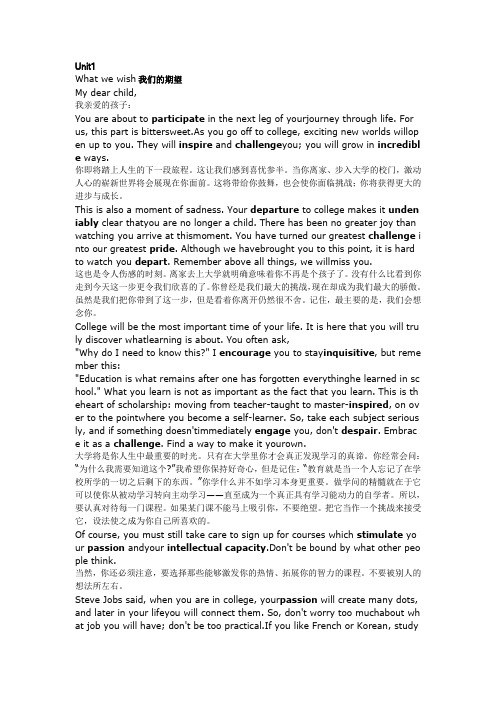
Unit1What we wish我们的期望My dear child,我亲爱的孩子:You are about to participate in the next leg of yourjourney through life. For us, this part is bittersweet.As you go off to college, exciting new worlds willop en up to you. They will inspire and challenge you; you will grow in incredibl e ways.你即将踏上人生的下一段旅程。
这让我们感到喜忧参半。
当你离家、步入大学的校门,激动人心的崭新世界将会展现在你面前。
这将带给你鼓舞,也会使你面临挑战;你将获得更大的进步与成长。
This is also a moment of sadness. Your departure to college makes it unden iably clear thatyou are no longer a child. There has been no greater joy than watching you arrive at thismoment. You have turned our greatest challenge i nto our greatest pride. Although we havebrought you to this point, it is hard to watch you depart. Remember above all things, we willmiss you.这也是令人伤感的时刻。
离家去上大学就明确意味着你不再是个孩子了。
没有什么比看到你走到今天这一步更令我们欣喜的了。
你曾经是我们最大的挑战,现在却成为我们最大的骄傲。
新视野大学英语课文翻译
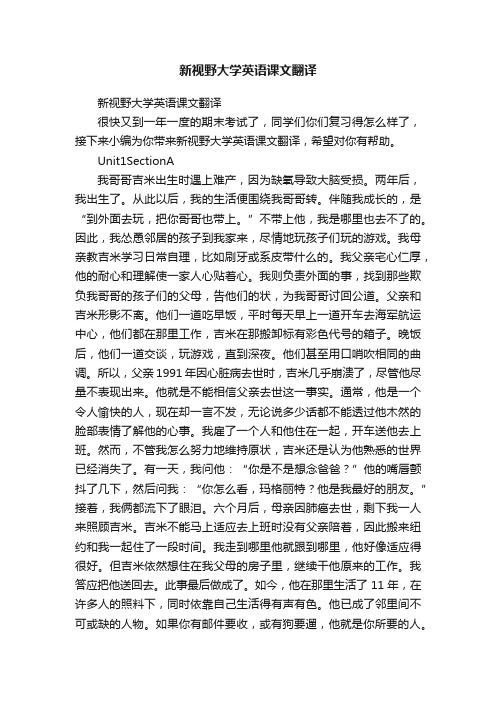
新视野大学英语课文翻译新视野大学英语课文翻译很快又到一年一度的期末考试了,同学们你们复习得怎么样了,接下来小编为你带来新视野大学英语课文翻译,希望对你有帮助。
Unit1SectionA我哥哥吉米出生时遇上难产,因为缺氧导致大脑受损。
两年后,我出生了。
从此以后,我的生活便围绕我哥哥转。
伴随我成长的,是“到外面去玩,把你哥哥也带上。
”不带上他,我是哪里也去不了的。
因此,我怂恿邻居的孩子到我家来,尽情地玩孩子们玩的游戏。
我母亲教吉米学习日常自理,比如刷牙或系皮带什么的。
我父亲宅心仁厚,他的耐心和理解使一家人心贴着心。
我则负责外面的事,找到那些欺负我哥哥的孩子们的父母,告他们的状,为我哥哥讨回公道。
父亲和吉米形影不离。
他们一道吃早饭,平时每天早上一道开车去海军航运中心,他们都在那里工作,吉米在那搬卸标有彩色代号的箱子。
晚饭后,他们一道交谈,玩游戏,直到深夜。
他们甚至用口哨吹相同的曲调。
所以,父亲1991年因心脏病去世时,吉米几乎崩溃了,尽管他尽量不表现出来。
他就是不能相信父亲去世这一事实。
通常,他是一个令人愉快的人,现在却一言不发,无论说多少话都不能透过他木然的脸部表情了解他的心事。
我雇了一个人和他住在一起,开车送他去上班。
然而,不管我怎么努力地维持原状,吉米还是认为他熟悉的世界已经消失了。
有一天,我问他:“你是不是想念爸爸?”他的嘴唇颤抖了几下,然后问我:“你怎么看,玛格丽特?他是我最好的朋友。
”接着,我俩都流下了眼泪。
六个月后,母亲因肺癌去世,剩下我一人来照顾吉米。
吉米不能马上适应去上班时没有父亲陪着,因此搬来纽约和我一起住了一段时间。
我走到哪里他就跟到哪里,他好像适应得很好。
但吉米依然想住在我父母的房子里,继续干他原来的工作。
我答应把他送回去。
此事最后做成了。
如今,他在那里生活了11年,在许多人的照料下,同时依靠自己生活得有声有色。
他已成了邻里间不可或缺的人物。
如果你有邮件要收,或有狗要遛,他就是你所要的人。
新视野大学英语读写教程(第二版)第二册课文及翻译
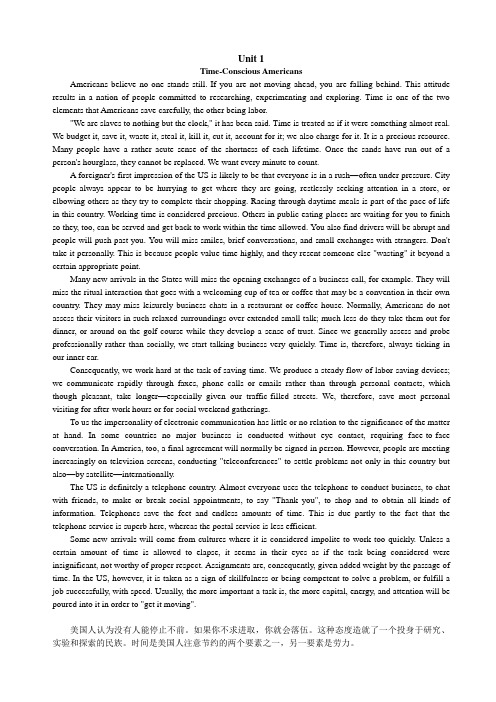
Unit 1Time-Conscious AmericansAmericans believe no one stands still. If you are not moving ahead, you are falling behind. This attitude results in a nation of people committed to researching, experimenting and exploring. Time is one of the two elements that Americans save carefully, the other being labor."We are slaves to nothing but the clock," it has been said. Time is treated as if it were something almost real. We budget it, save it, waste it, steal it, kill it, cut it, account for it; we also charge for it. It is a precious resource. Many people have a rather acute sense of the shortness of each lifetime. Once the sands have run out of a person's hourglass, they cannot be replaced. We want every minute to count.A foreigner's first impression of the US is likely to be that everyone is in a rush—often under pressure. City people always appear to be hurrying to get where they are going, restlessly seeking attention in a store, or elbowing others as they try to complete their shopping. Racing through daytime meals is part of the pace of life in this country. Working time is considered precious. Others in public eating-places are waiting for you to finish so they, too, can be served and get back to work within the time allowed. You also find drivers will be abrupt and people will push past you. You will miss smiles, brief conversations, and small exchanges with strangers. Don't take it personally. This is because people value time highly, and they resent someone else "wasting" it beyond a certain appropriate point.Many new arrivals in the States will miss the opening exchanges of a business call, for example. They will miss the ritual interaction that goes with a welcoming cup of tea or coffee that may be a convention in their own country. They may miss leisurely business chats in a restaurant or coffee house. Normally, Americans do not assess their visitors in such relaxed surroundings over extended small talk; much less do they take them out for dinner, or around on the golf course while they develop a sense of trust. Since we generally assess and probe professionally rather than socially, we start talking business very quickly. Time is, therefore, always ticking in our inner ear.Consequently, we work hard at the task of saving time. We produce a steady flow of labor-saving devices; we communicate rapidly through faxes, phone calls or emails rather than through personal contacts, which though pleasant, take longer—especially given our traffic-filled streets. We, therefore, save most personal visiting for after-work hours or for social weekend gatherings.To us the impersonality of electronic communication has little or no relation to the significance of the matter at hand. In some countries no major business is conducted without eye contact, requiring face-to-face conversation. In America, too, a final agreement will normally be signed in person. However, people are meeting increasingly on television screens, conducting "teleconferences" to settle problems not only in this country but also—by satellite—internationally.The US is definitely a telephone country. Almost everyone uses the telephone to conduct business, to chat with friends, to make or break social appointments, to say "Thank you", to shop and to obtain all kinds of information. Telephones save the feet and endless amounts of time. This is due partly to the fact that the telephone service is superb here, whereas the postal service is less efficient.Some new arrivals will come from cultures where it is considered impolite to work too quickly. Unless a certain amount of time is allowed to elapse, it seems in their eyes as if the task being considered were insignificant, not worthy of proper respect. Assignments are, consequently, given added weight by the passage of time. In the US, however, it is taken as a sign of skillfulness or being competent to solve a problem, or fulfill a job successfully, with speed. Usually, the more important a task is, the more capital, energy, and attention will be poured into it in order to "get it moving".美国人认为没有人能停止不前。
新视野英语教程读写教程B1-U1-SB

Vocabulary study
5. confused adj. mixed up in one's mind 迷惑的;糊涂的 [例] He gets confused easily. 他很容易被搞糊涂。 [例] Jane felt confused about love and marriage. 琼对恋爱和婚姻感到很迷惑。
新视野视听说(第三版)B1U2 听力原文
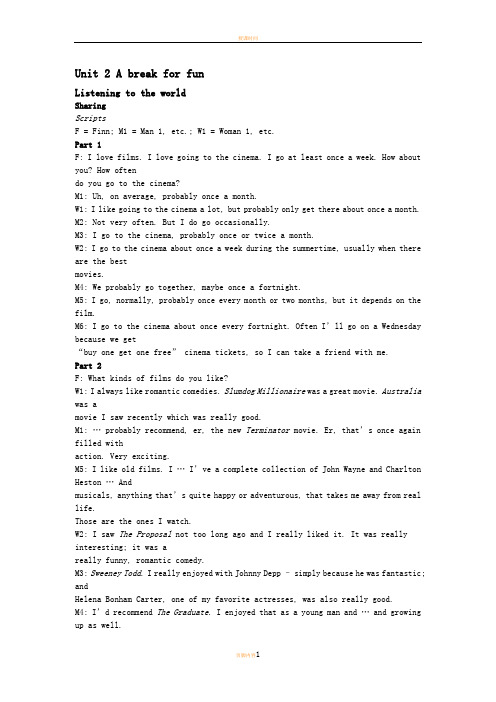
Unit 2 A break for funListening to the worldSharingScriptsF = Finn; M1 = Man 1, etc.; W1 = Woman 1, etc.Part 1F: I love films. I love going to the cinema. I go at least once a week. How about you? How oftendo you go to the cinema?M1: Uh, on average, probably once a month.W1: I like going to the cinema a lot, but probably only get there about once a month. M2: Not very often. But I do go occasionally.M3: I go to the cinema, probably once or twice a month.W2: I go to the cinema about once a week during the summertime, usually when there are the bestmovies.M4: We probably go together, maybe once a fortnight.M5: I go, normally, probably once every month or two months, but it depends on the film.M6: I go to the cinema about once every fortnight. Of ten I’ll go on a Wednesday because we get“buy one get one free” cinema tickets, so I can take a friend with me.Part 2F: What kinds of films do you like?W1: I always like romantic comedies. Slumdog Millionaire was a great movie. Australia was amovie I saw recently which was really good.M1: … probably recommend, er, the new Terminator movie. Er, that’s once again filled withaction. Very exciting.M5: I like old films. I … I’ve a complete collection of John Wayne and Charlton Heston … Andmusicals, anyt hing that’s quite happy or adventurous, that takes me away from real life.Those are the ones I watch.W2: I saw The Proposal not too long ago and I really liked it. It was really interesting; it was areally funny, romantic comedy.M3: Sweeney Todd. I really enjoyed with Johnny Depp –simply because he was fantastic; andHelena Bonham Carter, one of my favorite actresses, was also really good.M4: I’d recommend The Graduate. I enjoyed that as a young man and … and growing up as well.I think it’s a “coming of age” film.M6: My favorite film is called Golden Eye. It’s a James Bond film and I think the action scenesare just absolutely fantastic in it.Part 3F: Who’s your favorite actor?M5: John Wayne’s my favorite actor.M6: My favorite actor is the new Ja mes Bond, er, Daniel Craig. I think he’s very good at showingemotions in his films. My favorite actress is called Angelina Jolie. She’s very beautiful, butshe’s also played lots of different roles in films.M3: My favorite actor is Johnny Depp because I think he’s funny and I think he’s lively and healways has energy on stage.W2: My favorite actor is Brad Pitt. He’s very good-looking and he can play many different rolesand he’s very talented.M4: My favorite film star’s Robert DeNiro because I look lik e him.ListeningScriptsI = InterviewerPart 1I: Hello and welcome to Fashion Now, with me, Dan Taylor. In today’s program, we ask thequestion, “What is beauty?” Do men today really like women with blonde hair and blue eyes?And do women like the James Bond look – tall, dark and very masculine, or do they likesomething different now? Are ideas about beauty changing? We went out to see what you reallythink …I = Interviewer; W1 = Woman 1, etc.; M1 = Man 1, etc.Part 2I: Excuse me, ladies. Do you have a moment?W1: Yes?I: Just a quick question. Research says that these days women prefer men with feminine faces …W1: Really?I: Yes. It’s true … honestly!W1: I don’t agree at all. I like masculine faces …I: Can I show you some photos?W1: Sure.I: So which of these guys do you like best?W1: Hmm, Sean Connery. He’s definitely the best-looking man here. And he’s tall, isn’t he?Yeah … I like tall men. And I like a man with a beard.I: Uh-huh. What about you?W2: Mm. I’m not sure. I like this one. What’s hi s name?I: It’s Gael Garcia Bernal. He’s a Mexican film star.W2: Yeah? Well, he’s got quite a feminine face and he’s very good-looking. I like his eyes –he’sgot dark brown eyes and I like men with dark eyes and black hair. But I think it’s more in thep ersonality … in the smile … so I like this one best. Will Smith. He’s got a really nice smile.I: Thank you. And here’s another lady. Excuse me. Have you got a moment?W3: Well …I: I’m doing a survey about the changing face of beauty. Can I ask you some q uestions? W3: Yes, OK. Yes.I: I’ve got some photos here. Can you tell me which of these people you like? Do you think anyof them are good-looking?W3: Well, I don’t really like any of them …I: No? Er, well, so what sort of man do you like?W3: What sort of man do I like? Well, my husband’s over there. I think he’s goodlooking. I likehis hair. I love guys with red hair.I: Which one? The one looking in the shop window?W3: No, he’s over there. He’s wearing a white T-shirt and he’s talking to … that blond e woman …Excuse me …I: And then I talked to some men to find out if they really prefer blondes – just like they did 50years ago. Do you think it’s true that men prefer blondes, sir?M1: What? No, not at all! Beauty comes in all shapes and sizes and ages. Look at this photo ofJudi Dench. She’s lovely. She isn’t young, but she’s got beautiful grey eyes and she alwayswears beautiful clothes. She looks kind and intelligent.M2: Yeah, she does. But I still prefer blondes, you know … like Scarlett Johansson. She’slovely … slim, blonde hair, blue eyes –that’s the sort of woman I like.M1: Scarlett Johansson, slim?M2: Well, OK … but she’s not fat.M1: No, that’s true …I: OK, guys. Thanks for talking to us …ViewingScriptsV = Voice-over; W1 = Woman 1, etc.; M1 = Man 1, etc.V: All over the world, festivals bring people together. But why do people go? For the music?The food? The fun and games? We went to Bestival in the Isle of Wight, England to find out.But the first question is – where do we sleep?M1: I ... I’ve got a beach hut up here to stay in, and I’ve got the key.V: One man said it was like sleeping in the back garden.M2: It’s like opening your back door, going down to the end of your garden, getting in your shedwith your baby and wife, and then calling it a holiday.V: You can stay in a hut, but most people here sleep in tents. There are a lot of different peoplehere – families, young people, older people. We asked: Why do so many different peoplecome to festivals?W1: Well, I suppose it gives everybody a chance just to be themselves, and just to be free and beaway from their normal jobs.W2: People will respect each other and have ... um … sort of some of thoseold-fashionedtraditional values, but actually values that everyone really likes.M3: The thing I always think about festivals is they’re just playgrounds for grownups.V: And, of course, there’s one reason everyone’s here: the music. This really is a festival for allthe community, young and old mixing together. In the tea tent these women are having agreat time. Why do they go to festivals?W3: The community getting together, the young mixing with the older people. We make cakes; wedo pop festivals; we’ll go anywhere, do anything.V: So, if there’s one answer to the question, why are you here? One thing that everyone talksabout is this: being together.Speaking for communicationRole-playScriptsConversation 1W: OK … What do you feel like watching?M: Hmm. I … I don’t know really. What do you recommend?W: Um … Well, how about French Kiss? Do you know it?M: No, I don’t think so. What’s it about?W: Well, it’s a romantic comedy. It’s about an American woman. She goes to France and meets aFrench guy and … they fall in love. It’s quite old, but it’s really funny. M: Um, sounds OK, I s uppose. Who’s in it?W: Meg Ryan and Kevin Kline.M: Oh, I like Meg Ryan. Mm. Do you think I’d like it?W: Yeah, I think so. You like comedies, don’t you? And it’s very funny.M: Yeah, OK. Why don’t we get it then?W: Great. Excuse me. Can we have this one, please?Conversation 2W: What was the last DVD you saw?M: Um, Let me think. Oh – I know, it was Speed.W: Speed? Is it new? What’s it about?M: No, it’s a bit old actually. It’s an action film. It’s about a bus and it can’t stop. It has to go attop sp eed or … or it explodes. It’s great!W: Right. Who’s in it?M: Sandra Bullock and … the guy is, the actor is, er … Keanu Reeves.W: Mm. Do you think I’d like it?M: Well, do you like action films?W: Mm … not really. I prefer romantic films and dramas.M: Oh, then I don’t think you’d like it … Er, well. Oh, I know. I think you’d like that French film,you know, with the actress Juliette Binoche. What’s it called? Oh, yeah: Chocolat. W: Chocolat? Do I know it? … Oh, with Johnny Depp? Mm! Now that is a good recommendation.Have you got the DVD?Group discussionScriptsRecently I went to a concert in the park with my boyfriend and some other friends. It was inCity Park … We went because we all like the band, Double-X, and we listen to their music all thetime.The concert only lasted two hours, but we took a picnic with us and went out early in theafternoon – it was a free concert, you see, so there were already a lot of people sitting out in thepark in front of the stage.We got a really good place, close to the stage. We chatted and lay in the sun all afternoon …and then in the evening more and more people came and it got quite crowded. Then the concertstarted and well, it was … fantastic! Double-X is an amazing band … and betterlive!I really liked the concert because everyone was dancing and singing –we had a great time.Further practice in listeningShort conversationsScriptsConversation 1W: Why didn’t you show up at John’s party last night? He was expecting you. You know, he isleaving the city for good.M: I’m terribly sorry. I had planned to go, but I had to take care of an emergency.I tried callinghim many times but couldn’t reach him.Q: Why didn’t the man go to the party?Conversation 2M: I haven’t seen you around for quite a while. What ha ve you been doing?W: I’ve been reading Shakespeare’s great play Hamlet. My literature professor required me topresent a unique review about Hamlet for my term paper.Q: What has the woman been preparing for?Conversation 3W: Which do you prefer, classical music or pop music?M: Neither. Have you ever seen me listening to music at all? You know, I don’t have an ear formusic.Q: What does the man say about music?Conversation 4M: I’m taking the minimum credits to graduate. Making friends, traveling, part ying – these arewhat matter most to me right now.W: I’m not here to make friends or go to parties. I’m doing part-time jobs to save money to startmy own company once I graduate.Q: What are the two speakers talking about?Conversation 5W: Tom, have you read the notice on the school website? I’ve won the scholarship for next term.M: No surprise to me. You have earned it. While others are at parties, you are in the library.Q: What does the man mean?Long conversationScriptsM: After such a tiring week, I can’t wait to have a rest and relax a little this weekend.W: Me too, Mr. Simpson. So what are you doing this weekend? Looks like it’ll be nice weatherfor sailing.M: Yes, Mary, I hope it stays this sunny. I’m going out to the beach and spending all weekendsurfing.W: You, sir? Surfing?M: Haha, I bet you think I’m too old for surfing! I’ve been surfing since I was 11, and it’s still myfavorite activity. The cool blue waves, the smell of the sea, just take me back to when I was ateenager free from care. I forget all my troubles. By Sunday night, I fall into a deep sleep, soreand tired, without a care in the world.W: That’s really nice. I’m going to the beach, too. I love relaxing in the warm sun, watching myniece and nephew play in the sand and jum p in the waves. They’ll tire themselves out buildingsand castles, collecting seashells, and trying to bury each other in the sand. M: Oh, I remember building sand castles with my brothers ... such great fun. How old are littleTimmy and Monica now?W: Tim’s five and Monica’s three.M: Wow, kids grow up so fast!Q1: Why is surfing the man’s favorite activity?Q2: What is the woman going to do this weekend?Q3: What does the woman love doing?Q4: What does the man remember doing with his brothers?Passage 1ScriptsPeople in Britain enjoy various leisure activities including watching TV, seeing friends andrelatives, listening to music, shopping, listening to the radio, gardening, doing sports, reading, andso on. The latest data from a survey show that in 2010, 89 percent of all adults watched televisionin their free time. Spending time with family and friends was the second most popular activity at84 percent, listening to music came next at 76 percent, and shopping was fourth at 71 percent.Truly, the most common leisure activity in the UK has been watching television. The averageviewing time is 25 hours per person per week. Many television programs are about wildlife,animals, holidays, cooking and gardening. All these things are much valued by British people. Thesecond most popular activity in Britain is visiting or entertaining friends or relatives. Actually, inthe survey, those aged 25 to 34 reported spending time with friends and family as their top activity.Besides, many British people like to listen to music. Among those aged 16 to 24 spending timelistening to music was selected as their top activity.Younger people tend to have different hobbies from old people. According to the survey,comparing the 16 to 24 age group with those aged 55 and over, the activities which were reportedless frequently as age increased were listening to music; surfing the Internet and emailing; doingsports and exercise; going out to pubs, clubs or bars; and going out to the cinema. For example,people aged 16 to 24 spent more than 3 hours a day using a computer while those aged 55 andover spent only 1 hour and 12 minutes. Again comparing the youngest and oldest age groups, theactivities which were reported more frequently as age increased were reading and gardening.Q1: According to the survey, what percentage of British adults watched TV in their free time?Q2: Which age group would be the most likely to visit their friends and relatives? Q3: What does the speaker say about listening to music as a leisure activity for British people?Q4: According to the survey, how are leisure activities related to age?Passage 2Scripts and answersPeople joke that no one in Los Angeles reads; everyone watches TV, rents videos, or goes tothe movies. The most popular reading materials are 1) comic books, movie magazines, and TVguides. City libraries have only 10 percent of the 2) traffic that car washes have. But how do youexplain this? A yearly book festival in west Los Angeles is 3) constantly “sold out” year after year.People wait half an hour for a parking space to become 4) available.This outdoor festival, supported by a newspaper, takes place every April for one weekend.This year, about 70,000 people 5) took part in the festival on Saturday and 75,000 on Sunday. Thefestival 6) attracted 280 exhibitors. There were about 90 talks given by authors, with an 7)audience question-and-answer period following each talk. A food court sold all kinds of localfoods, from hotdogs to ice drinks. Except for a $7 parking fee, the festival was 8) free of charge.Even so, some people take their own sandwiches and drinks to avoid the high prices of the foodcourt.The idea for holding the festival in Los Angles was 9) put forward years ago, but nobodyknew if it would succeed. Although book festivals were already popular in other US cities, wouldpeople in this city 10) embrace one? “Fortunately, they do,” said one of the festival founders.。
新视野大学英语第二版—读写教程全四册课文翻译
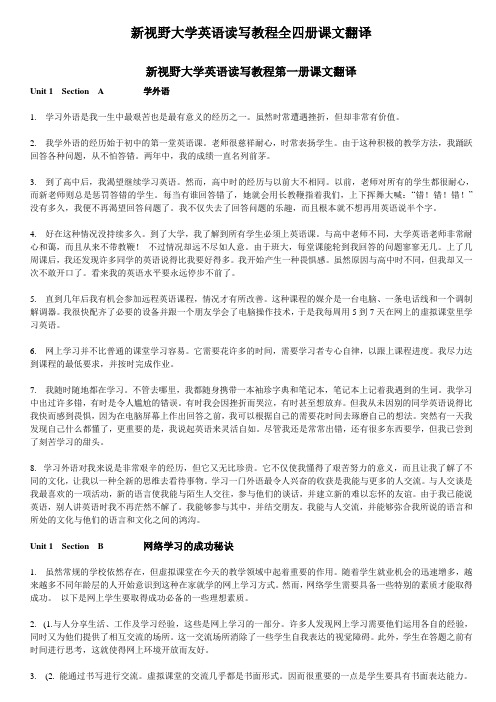
新视野大学英语读写教程全四册课文翻译新视野大学英语读写教程第一册课文翻译Unit 1 Section A 学外语1. 学习外语是我一生中最艰苦也是最有意义的经历之一。
虽然时常遭遇挫折,但却非常有价值。
2. 我学外语的经历始于初中的第一堂英语课。
老师很慈祥耐心,时常表扬学生。
由于这种积极的教学方法,我踊跃回答各种问题,从不怕答错。
两年中,我的成绩一直名列前茅。
3. 到了高中后,我渴望继续学习英语。
然而,高中时的经历与以前大不相同。
以前,老师对所有的学生都很耐心,而新老师则总是惩罚答错的学生。
每当有谁回答错了,她就会用长教鞭指着我们,上下挥舞大喊:“错!错!错!”没有多久,我便不再渴望回答问题了。
我不仅失去了回答问题的乐趣,而且根本就不想再用英语说半个字。
4. 好在这种情况没持续多久。
到了大学,我了解到所有学生必须上英语课。
与高中老师不同,大学英语老师非常耐心和蔼,而且从来不带教鞭!不过情况却远不尽如人意。
由于班大,每堂课能轮到我回答的问题寥寥无几。
上了几周课后,我还发现许多同学的英语说得比我要好得多。
我开始产生一种畏惧感。
虽然原因与高中时不同,但我却又一次不敢开口了。
看来我的英语水平要永远停步不前了。
5. 直到几年后我有机会参加远程英语课程,情况才有所改善。
这种课程的媒介是一台电脑、一条电话线和一个调制解调器。
我很快配齐了必要的设备并跟一个朋友学会了电脑操作技术,于是我每周用5到7天在网上的虚拟课堂里学习英语。
6. 网上学习并不比普通的课堂学习容易。
它需要花许多的时间,需要学习者专心自律,以跟上课程进度。
我尽力达到课程的最低要求,并按时完成作业。
7. 我随时随地都在学习。
不管去哪里,我都随身携带一本袖珍字典和笔记本,笔记本上记着我遇到的生词。
我学习中出过许多错,有时是令人尴尬的错误。
有时我会因挫折而哭泣,有时甚至想放弃。
但我从未因别的同学英语说得比我快而感到畏惧,因为在电脑屏幕上作出回答之前,我可以根据自己的需要花时间去琢磨自己的想法。
- 1、下载文档前请自行甄别文档内容的完整性,平台不提供额外的编辑、内容补充、找答案等附加服务。
- 2、"仅部分预览"的文档,不可在线预览部分如存在完整性等问题,可反馈申请退款(可完整预览的文档不适用该条件!)。
- 3、如文档侵犯您的权益,请联系客服反馈,我们会尽快为您处理(人工客服工作时间:9:00-18:30)。
entitled “Bridging the Generation Gap” that might
help.
随 笔
New Words Questions Choice Making
NHCE
技巧
自测
Chinese
Question 4
5. Show respect. An attitude of respect and trust
随
笔
New Words
Questions
Choice Making
NHCE
技巧
自测
Chinese
10. Don’t apply double standards. Teenagers pay close attention to double standards. Don’t expect them to follow rules you don’t follow yourself.
1
2
Text Study
Part III (Paras. 4-12)
The tips to help bridge the Generation Gap
Tips
• • • • • • • • Show respect; Listen more than you talk; Ask whether your child wants to hear it…; Think “we” instead of “you”; Keep calm; Don’t apply double standards; Admit your own mistakes…; Enjoy them.
随
笔
New Words
Questions
Choice Making
NHCE
技巧
自测
Chinese
Question 3
4. Of course, general trends can’t always be applied to
individual cases. It is natural to feel like there is an
随
笔
New Words
Questions
Choice Making
NHCE
技巧
自测
Chinese
3. Many studies on youth also refute the concept
of a generation gap. These studies show that
while young people tend to value their peers’ evaluations over parents’ on things like music, clothing and what’s “cool”, they continue to look to parents for basic values and guidance in the more important areas of life, such as career and lifetime goals.
asked to tap into basic beliefs and values, such as
“Hard work is the key to getting ahead” and
“America is the very best place in the world to live
in”. Across the generations, there was great consistency in the responses.
随
笔
New Words
Questions
Choice Making
NHCE
技巧
自测
Chinese
Question 7
9. Keep calm. You can easily destroy your
credibility by getting angry or too excited during a
ability to make decisions and learn from their
mistakes.
随
笔
New Words
Questions
Choice Making
NHCE
技巧
自测
Chinese
Question 5
6. Listen more than you talk. Questioning can sound like
随 笔
New Words
Questions
Choice Making
NHCE
技巧
自测
Chinese
Question 6
8. Think “we” instead of “you”. “We have chores to do before we leave the house; how can we take care of what needs to be done?” Any way you can get across the message “We’re in this together” can help bridge gaps that conflicts might otherwise create.
Whether it’s about checking in by the phone,
putting things away or drinking out of the milk carton, “Do as I say and not as I do” will not improve the relationship.
NHCE
技巧
自测
Is There a Generation Gap?
Chinese
Question 1
1. The term “generation gap” was coined in the 1960s. One concept of the generation gap is that parents and children have different values and beliefs. As a result, many parents fear that peer opinions will become more highly valued and that they in turn will lose influence. Although the term continues to be used often, some people are beginning to ask the question, “Is there a generation gap in today’s society?”
UNIT 2
Is There a Generation Gap?
Time passes. People change.
1
2
Structure Analysis
Talking According to the Picture
1
2
Text Study
I. Structure Analysis
interrogation. Instead, adopt an attitude of curiosity rather than control. Ask questions like “How so? What do you think now? Were you surprised? What will you do now? What’s your plan? Is this something you want help with?” If your object is only to listen, you should be careful not to be preparing your response while your teen is still talking. You’ll hear better that way, and they will be encouraged to talk more.
can be contagious. Young people tend to see
themselves the way their parents see them. In
turn, they gain self-confidence and respect for
themselves when you show that you respect their
1
2
“Remember the Golden Rule? “Treat others as you would like to be treated.” Change it to the Platinum Rule: “Treat others as they would like to be treated.”
uncomfortable “gap” between our teens and us and
that there is a need to bridge it. Perhaps, though, the problem does not lie in a difference of opinions or values, but in the way we relate to and communicate with each other. Here are some tips from an article
